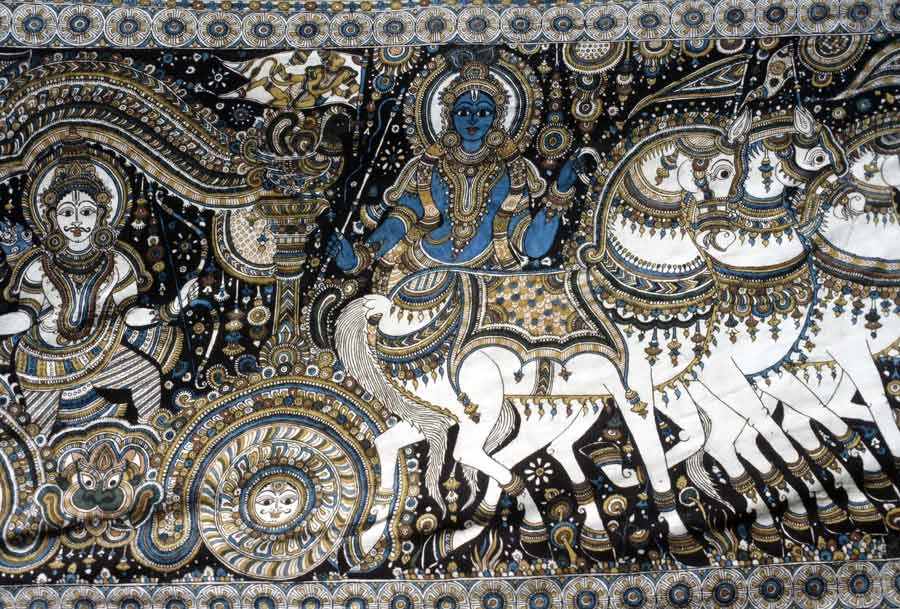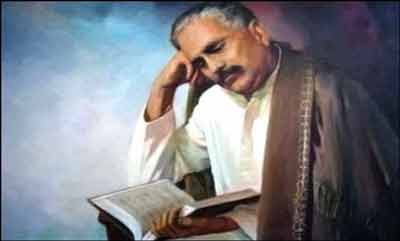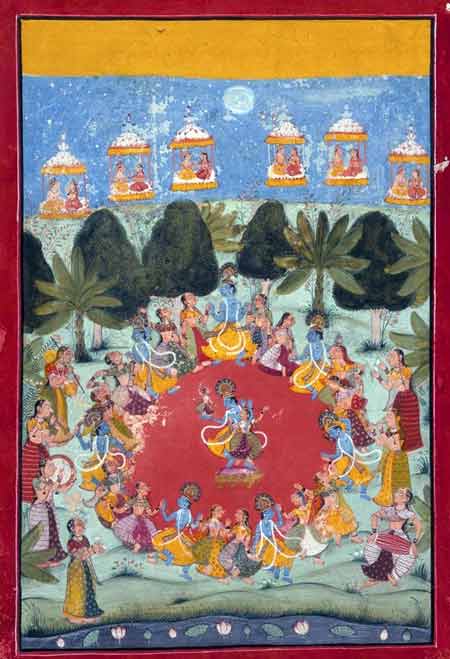
Krishna on his chariot with Arjuna as his passenger from the Bhagavad Gita, on Kalamkari cloth.
Muhammad Iqbāl, popularly known as Allama Iqbāl, the spiritual founder of Pakistan, once had something of an illumination, which led him to the reflection,
as he wrote in his well-known Urdu poems, Bang-e-Dara, that once while returning from a prison (metaphorically 'bonded-state'). "I realised that
in the Gītā is contained the Qur'ān, and in the Qur'ān the Gītā.[1] (He is referring of
course, to the celebrated Sanskritic Hindu text Bhagavad Gītā).
This, on the face of it, is an amazing if not a provocative admission, and an unlikely one to come from somebody who found himself to be poles apart from
that other contemporary Indian patriot, who swore by the Gītā, and said of the Almighty that "Ishvara and Allāh" were equally
His names. If Gītā contains the Qur'ān and the Qur'ān the Gītā, Iqbāl and Gandhi between them should have been able to find a less bloody
solution to the Hindu-Muslim problem, and there should have been no cause for a separate Muslim patriotism that found itself pitted against the alleged
'Hindu' nationalism, Unless, of course, we take the Gītā and the Qur'ān to be unequivocally preaching just such intolerance and territorial
demarcations based on religious differences. It is doubtful that Iqbāl read a clear mandate for unrestrained jihad[2] in the Qur'ān and a similar vindication of war in the battlefield sermon of Kṛṣṇa to a
despondent Arjuna. Rather, Iqbāl saw in the tenets of at least the Qur'ān the fundamental basis for the unity of humankind, and of brotherhood, under a
social order that did not succumb to the divisions of race, religion, gender, nation and tribes (except perhaps for the nominal purposes of identification).[3] He expected the same of the Gītā's fine teachings. If there was an opposition, it should come
to naught, or end in futility, just as Iqbāl thought of the "amazing tussle between the shaikh and the brahmin, in which neither lost nor won."[4] Should it strike a greater note of irony that the same Iqbāl is famous for the lyrics of a popular
Hindustani song (declaring the brotherhood of Hindus, Muslims, Sikhs and Christians of the subcontinent)? –

la ilaha illa Llāh
"Hindu, Muslim, Sikh, Ishai saab hei bhai-bhai."
To Iqbāl, however, finding the Gītā in the Qur'ān, and vice versa, did not necessarily entail that one accepts just about anyone's interpretation
of the Gītā – not the least of those who tended to read the same sort of pantheistic monism in the Gītā that several Islamic thinkers had
been guilty of, particularly in the form of doctrine of Wahdat-al-Wujūd or 'unity of Being', sometimes rendered at 'Unityism'. Śaṅkara, and to an
extent Rāmānuja, would be singled out as perpetrators of Hindu version of absolutism, and the mystic Shaikh Muhyid-Dīn Ibn-al'Arabī as the principal
expositor of the corresponding Islamic doctrine. In Iqbāl's own judgement, which is expressed in the Preface to Asrār-e-Khūdi (Secrets of the
Self):[5]
In the analysis of the question of the asrār (self) there are references to strange and amazing similarities in the historical backgroundof Muslim
and Hindu thought; the very angle from which Śrī Śaṅkarācārya gave an exegesis of the Gītā, is the point of view from which Shaikh Ibn-al'Arabī of
Andalusia has given a commentary on the Qur'ān, and that has left a deep impact on Muslims.
A deep impact or impression, though, on which Muslims and to what end? Is Iqbāl as approbating as he sounds to be, or is he prefacing that to which he is
going to provide a corrective, as it were? And was this the only instance of similarity between Hindu and Islamic thought that troubled him, or that he
found to be interesting, and was it to have any effect on his own analysis of the problematic?
The deep impression that Iqbāl speaks of was left on the generality of mystics all over the Islamic world, and since fourteenth century the concomitant
pantheistic ideas formed the common theme of most Islamic poetry.[6] Iqbāl was quick to blame this doctrine
for the decadence which characterised all Eastern people in general and Islamic people in particular in respect of their indifference to the world of
Appearance in deference to the spirit of other-worldliness.[7] This, not withstanding, he thought the
reformist efforts of the Aligarh Movement instigated by Sayyid Ahmad Khān, confounded though by the heresies of the Qādīyania belief in the complementarity
of the revelation of the founder of the Ahmadeyya movement, who declared himself to be the buruz of Prophet Muhammad, making his own finality
virtually the finality of Muhammad.[8]
The doctrine of 'Unityism', to Iqbāl, smacked of pantheistic monism, which he believed, inevitably led people to the belief in illusionariness of the world
and only served to paralyse the capacity for action amongst the people who otherwise took delight in spending all their time thinking of other-worldly joys
(be it Nirvāṅa, or the mystic extinction in God).[9] The impressions then were anything but deep in Iqbāl's
own mind. On the contrary, he struggled hard to rid his mind free of such a spell he himself had come under apparently quite independently of Islamic
mystic and Hindu thinkers. That independent influence is attributed to Iqbāl's deep study of European idealists and modern netaphysical thinkers, from
Hegel, through Kant, Fichte, and Nietszche, to Henri Bergson, Bradley, McTaggart and Whitehead. Thus there was obviously a tension in Iqbāl; perhaps not
unlike the tension one finds in the Gītā as it tries to strike a balance between the absolutism of the by-gone Upaniṣadic era, on the one hand,
and the bhaktism with its radical theodicy that was gaining momentum in Gītā's time (if not promulgated by the Gītā itself).
What is fascinating is that Iqbāl arrives, as a result of this tension, to a distinctive Islamic syncretism, presumably quite independently of the Hindu,
not to speak of Vedāntic influence, that he had embraced during his early thinking career. And in this he attempted to give Indian Islam a distinctive turn
that freed it from the metaphysical implications of pantheistic monism that had become ingrained in much of the Sūfī tradition, whose earliest link with
India might have been created by al-Bīrūnī. Iqbāl finds vindication for this syncretism in the Qur'ān, in the Prophet's teachings and, in particular, in
the life and works of Indian Muslim leaders who preceded Iqbāl. He then discovers that this is precisely where the Gītā is at, so to speak. This
discovery struck a warm chord in Iqbāl, and he was greatly comforted by it. He extolled the teachings of Śrï Kṛṣṇa, and was encouraged to learn that one of
his shaikh friends, Maulāna Abdul Majīd Daryabād, was doing a comparative study of his Qur'ān-based Asrār-e-Khūdi[10] and the Bhagavad Gītā. Thus is understandable his evocation, with which we began this
discussion: that the Gītā is in the Qur'ān and the Qur'ān in the Gītā.

Allama Iqbal
Indian Origins of Iqbāl
In light of these remarks, we may ask: was Iqbāl then a typically Indian thinker? and was his synthetic approach just another variation on the theme
followed by most Indian thinkers, from the authors, whoever they might have been, of the Upaniṣads (especially of Iśa and Śvetāśvatera fame)
and of the Gītā, down to the likes of Ram Mohun Roy, Sri Aurobindo, Radhakrishnan and to some degree Gandhi himself?[11] Iqbāl, after all, was born of brahmanical ancestry. His ancestors were Kashmirī Brahmins who
converted to Islam about three hundred years before his birth in February 1873 at Sialkot in the Punjāb. Iqbāl self-consciously refers to his brahmanical
extraction in this verse:[12]
Look at me, for a Hind thou wilt not see again.
A man of Brahmin extraction versed in the mystical
knowledge of Rūm [Rūmī] and Tabrīz.
To pursue his biographical details a while, Iqbāl moved to Lahore, where he received further education and began to write poetry (in Urdu, since Persian
was being phased out in the subcontinent). In 1905 he went to Europe and studied in Cambridge, Munich and taught in London. His doctorate thesis was a
masterly work on The Development of Mataphysics in Persia.[13] Here he came under strong influence
of Hegelian writers, but he also found affinity with Greek thinkers and the German romantic idealists we mentioned earlier – though he derided the
Neoplatonists and later rejected Plato as well. But it was the French Philosopher Henri Bergson who was to have an even greater impact on the budding Muslim
mind. (Much later Iqbāl was to pay his tribute to Bergson in Paris, in 1931-2, greeting him with the Qur'ān phrase that had Bergson totally disarmed,
namely, 'Don't vilify Time!').[14]
While in Cambridge he had spent considerable time with the philosopher McTaggart, who was later to confirm that Iqbāl's own orientations during his
Cambridge days tended towards pantheism and mysticism. McTaggart's own view was that selves were the ultimate reality whose true content and goodness were
to be found not in time but in eternity, and not in action but in love. It is clear that McTaggart's philosophy had left a deep impression on Iqbāl, though
he later rejected McTaggart's thesis of the unreality of time.[15]
In 1908 Iqbāl returned to Lahore and took up teaching philosophy and English literature in the Government College. Later he concentrated on law. Meanwhile,
he longed to return to the Eastern sources, and to refurbish the Islamic roots in the way that he thought Western but also Hindu, especially Vedāntic
thinkers, had achieved. This dream is evidenced in a telling paragraph he wrote in his Preface to The Development of Metaphysics in Persia. Iqbāl seemed
almost ashamed of his Persian heritage and while he might not have been taken in by the pantheistic leanings of the Śaṅkara-Vedānta system, he nonethless
comes out in laudatory eloquence on the virtues of the Hindu intellectual disposition; it is worth quoting the passage in question at some length:[16]
"The subtle Brahmin sees inner unity of things; endeavours to discover it in all aspects of human experience, and illustrates its hidden presence in the
concrete in various ways. ...The Hindus, while admitting, like the Persian, the necessity of higher source of knowledge, yet calmly moves from experience to
experience, mercilessly dissecting them, and forcing them to yield their underlying universality. In fact the Persian is only half-conscious of Metaphysics
as a system of thought; his Brahmin brother, on the other hand, is fully alive to the need of presenting his theory in the form of a thoroughly
reasoned-out system. And the result of this mental difference between the two nations is clear. In the one case we have only partially worked-out systems
of thought; in the other case, the awful sublimity of the searching Vedānta."
Might this early impression and gnostic appeal have made a subconscious acceptance of some elements of the Gītā's teachings much easier at a later
phase in his thinking? Of course, he soon came to reject the apparently meticulous model he had found in Vedānta, and either believed the Persians had as
much to offer or did not see the need for such hair-splitting analysis and sublimity of search.
The Eastern sources that Iqbāl clutched on to more seriously on his return were basically the Qur'ān, the Prophet's tradition, and the writings of mystics,
such as the theists Jalāl al-din Rūmī, Muhammad al-Ghazālī (whose disenchantment with his former profession of law and philosophy appealed to Iqbāl), and
the Indian scholastics, such as Shaykh Amnad Sirhindī (1564-1624 C.E.), Ibn-I-Abdul Wahāb (17thc), Sir Sayyīd Ahmad Khān (1817-98), and Shāh Walīullāh
(b.1703 C.E.), whom Iqbāl called 'the last great theologian of Islam'.[17] All three are renowned for their
Indo-Muslim revivalist leanings.
Ahmad Sirhindī is, of course, very important figure in the Indian tradition. Born in East Punjāb, Sirhindī's scholarship earned him a place in the court of
Akbar at Āgra, where he shared his mystical exuberances with the Mughal emperor, but later shifted his allegiance to the Naqshabandī reformist group under
Khwājah Bāqī-billāh. Overall, he is said to have influenced the restoration of the purity of Islam in India and inspired the orthodox reforms of Aurangzeb,
in his attempt to impose the sharī'at on the state.[18] Sirhindī, however, did not concern himself
directly with Hinduism (dubbed kufr) and other non-Islamic religions, except in some disparaging way. He was more concerned to instigate a
distinct role for India's Muslims vis-ā-vis Hindus, which, with Aurangzeb's reforms, provoked riots among Hindus.[19] Iqbāl himself paid his tribute to the revivalist Aurangzeb, who is credited with having extirpated the
libertarian movement of his rival brother Dārā Shukoh; the latter's heretical leanings went back to the Sūfis, but he was also the last to attempt a
reconciliation between Hinduism and Islam on the basis of their esoteric similarities.[20]
Non-Islamic sources, however, were to continue to exercise Iqbāl's mind, even if for their dialectical worth – i.e. in terms of finding some doctrine to
argue against, as was the case with Śaṇkara's particular interpretation of the Gītā.[21] More
positively, he had thought of narrating the Rāmāyaṇa in Urdu verse. He saw his own classic Jāvid Nāmah (his answer to Dante's Divine Comedy in line with the Hindu epics of Mahābhārata and Rāmāyaṇa). One might say this is indicative of Iqbāl's attraction
to the Smṛti literature, as distinct from the Śruti – with its overwhelming emphasis on polytheism (in the Vedas) and absolutism (in the Upaniṣads)
SirhindI, though, would have been truly appalled, for he did not see Rām and Rahmān as one and the same, or even comparable, and he was scornful of the
human characteristics of Hindu deities.[22] What would have been literature of the infidels (kufis
) was quite tolerable to Iqbāl; though he was worried about the polytheism and asceticism of the Purānas.

Krishna's Dance of Delight (Rasa Lila). Rajasthan, Bundi, India. ca. 1675-1700
Iqbāl's Metaphysic
For the particular problem areas of interest, we now turn to the discussion of some of Iqbāl's own insights and theories, particularly as regards the
nature of ultimate reality, revelation, mystical experience, and their ramifications in practical life. I want to discuss these in the context of their
affinity and parallel in the Gītā, with some reference, on the one hand, to Sirhindī, since his Islamic syncretic conservatism created waves for
later development, and on the other hand, to Radhakrishnan, who curled his brand of syncreticism in no small measure from the Gītā itself.
Although it is true that both Iqbāl and Radhakrishnan came heavily under the sway of idealistic and mystical thinkers (both Eastern and Western) in their
formative years, while Iqbāl tried to free himself, though not altogether successfully as Rascid reminds us,[23] Radhakrishnan absorbed the ideas and incorporated them in his vision of Vedāntic neo-realism. But they
were both products of their time, at a moment when Eastern intellectual thought was making a return to its own after centuries of foreign, in particular
Western European visitations. In Jāvid Nāmah, Iqbāl has Rūmī remind a Hindu sage, by name Jahān Dost, deep in meditation under a tree that: [24]
The East saw God but did not see the world;
The West crept along the world and fled away from God.
Remonstrating against his own lure to the West he howled: 'I drank the West's anammelled bowl, and darkness settled on my soul'; elsewhere he protested:
'Europe today is the greatest hindrance in the way of men's(sic) ethical achievements;[25] and in Jāvid Nāmah he calls into question India's wisdom and asceticism as well.
Iqbāl was obsessed with two philosophical problems that at the same time bring him closer to the Gītā in view of Gītā's own preoccupation
with these. One concerned the exacting nature of the ultimate reality, qua ontology of God, and the self's place in the scheme of being, the other
concerned the notion of action vis-à-vis the mystic renunciation of a life of action.
The ontological status of God is a topical issue for Iqbāl, as it had been for Sūfīs and theologians over many centuries. He develops this in a number of
his poetical works, but more pertinently in his Reconstruction of Religious Thought in Islam,[26] that
emerged from a series of lecture he delivered in South India in 1928. In this work Iqbāl looks for a fresh inspiration from modern thought and experience
to up-date and qualify the idealistic tendencies of early vis-à-vis Sūfī mystical philosophy, so as to move towards a more deed-oriented and
creative process of religious life and thought. Though Iqbāl is firmly committed to the unquestionable dogma that there is no God but God: lā ʾilāha ʾillā-llāh (one of the two super-rational pillars on which Islam is founded); yet he is of the view that human mind can penetrate the
mystery of the divine. Iqbāl's is one of the first to attempt to bridge the conceptual gap and explain Islamic cosmology in quasi-scientific terms, drawing
heavily from modern philosophical endeavours. Indeed, he would endorse Kṛṣṇa's insistence to Arjuna on 'insight accompanied by knowledge' for this awesome
task (BG X1.1). In this he appears to have sided the Sūfīs against the orthodox Sunna ulamā who took the word of Qur'ān to be the final
authority without need for interpretation on all such matters.[27] But to be equally fair to the spirit of
the Qur'ān, Iqbāl did emphasise the inadequacy of the human intellect in arriving at certain religious truths, such as the totality of God's
being. Here he would agree with Immanuel Kant that if there is to be some actuality (suggested for Kant by pure reason and expressed in the limiting idea
of thing-in-itself), it falls outside the boundaries of experience and consequently its existence cannot be rationally demonstrated. But what
kind of experience was Kant referring to? Obviously sense-experience guided by intuition. Iqbāl invokes Ibn al-'Arabī to suggest what might if the Kantian
view is reversed, so that 'God is a percept; the world a concept'![28]
That would render the awareness of God a possibility within the bounds of experience, albeit experience of a higher order. This might bring Iqbāl closer to
Śaṅkara's ideal of aparokṣānubhuti (i.e. immediate 'identificative' experience of the ultimate reality). But in other respects Iqbāl moves away
from the 'Ibn al-'Arabī's 'unitive' experience, and draws closer to Rūmī, al-Ghazālī and Sirhindī, who were also taken in immensely by the Sūfī vision of
'unity of Being' and 'Emanation', but were later persuaded otherwise by the views of the Sunnah – although Sirhindī seemed to keep having spurts
of heretical experiences.[29] Perhaps heretical tendencies were endemic to Indian Islam ever since
al-Bīrūnī made connections between the Sūfī speculations and the teachings of the Gītā and Patañjali's Yogasūtras, which he had attempted
to translate.[30] This may have even influenced Abu Yazed through Abū Alī al-Sindī, probably an Indian
Sūfī.[31] Inevitably, Sūfī ontological monism also implied large concessions to Hindu pantheism: either
they could be mutually harmonised, or both had to go. Indian Islam adjudicated towards the latter, and Iqbāl in no small measure contributed to this move.
Paradoxically, however, he retained a soft spot for the 'teachings of Śrī Krishna,' and I want to show why he had this appeal, whether and to what extent
he was justified.
Part II to follow
*Purushottama Bilimoria is a homeless vagabond in exile from Venus Bay in Australia.